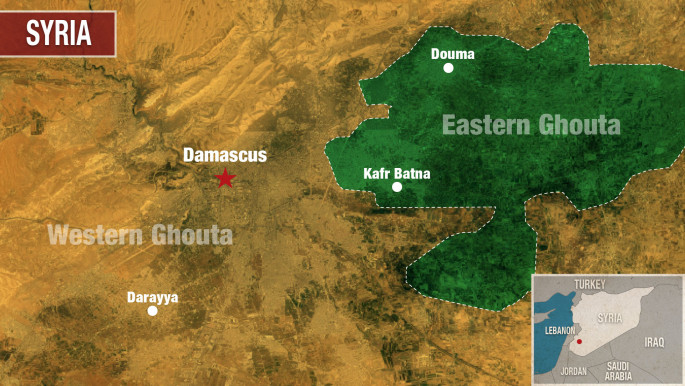Dead or alive, parents in Syria's Eastern Ghouta desperately search for their children
She was among 54 civilians killed on Monday in the latest wave of Syrian regime airstrikes on the rebel-held Eastern Ghouta enclave, of which Douma is the main town.
At least nine of the victims were children, according to the Syrian Observatory for Human Rights monitoring organisation. More than 300 people were wounded.
As more bodies were brought in from the chaos of the emergency room, Nidal knelt down near his lifeless daughter and cried - not just for her but also for the five other children he lost track of in the bombardment.
Farah was killed in the town of Masraba and her body brought to Douma by paramedics, who have been completely overwhelmed since the regime intensified its strikes two weeks ago.
"I have five other children I know nothing about, all five of them and their mother," he sobbed, resting his hand on the black shroud his daughter was wrapped in.
"Is there a fridge to put her in?" he asked.
 |
|
A volunteer for the civil defence, an organisation known as the White Helmets, awkwardly looked for something to tell the bereaved father and eventually said: "May God reward you."
Nidal later told AFP that he managed to find his other children.
Douma hospital was full of distraught civilians: one father slapped his forehead after finding his two dead children, another erupted into tears as he discovered the body of his newborn on a purple sheet next to a pool of blood.
Shellshocked children
Lost and wounded children also cried for their parents, others sat silently, rivulets of blood running down their faces whitened by dust from the strikes, as they received treatment.
Two of them sat next to each other on a cot, shellshocked and blood staining their fresh bandages.
They were left unattended because the scope of the disaster is such that the medical staff has to prioritise patients and five of them were busy treating a disfigured young boy who was screaming in pain.
Those scenes were repeated in hospitals across Eastern Ghouta, a semi-rural area which is controlled by Islamist and extremist groups and has been besieged by government forces since 2013.
Airstrikes have intensified and killed more than 300 people this month, in what appears to be a prelude to a ground offensive that could start any day.
In Hammuriyeh, another of the enclave's main towns, the hospital was also teeming with bloodied civilians looking for their relatives, dead or alive.
One man's heart was still beating but he had already been moved to the morgue, his head wounds so bad that his case was deemed hopeless.
Moments later, a man walked in looking for his son. As the sheets wrapping the bodies laid in front of him were lifted, he eventually identified his child and collapsed.
The Syrian conflict began when the Baath regime, in power since 1963 and led by President Bashar al-Assad, responded with military force to peaceful protests demanding democratic reforms during the Arab Spring wave of uprisings, triggering an armed rebellion fuelled by mass defections from the Syrian army.
According to independent monitors, hundreds of thousands of civilians have been killed in the war, mostly by the regime and its powerful allies, and millions have been displaced both inside and outside of Syria.
The brutal tactics pursued mainly by the regime, which have included the use of chemical weapons, sieges, mass executions and torture against civilians have led to war crimes investigations.





 Follow the Middle East's top stories in English at The New Arab on Google News
Follow the Middle East's top stories in English at The New Arab on Google News

![Israeli forces ordered bombed Gaza's Jabalia, ordering residents to leave [Getty]](/sites/default/files/styles/image_330x185/public/2176418030.jpeg?h=a5f2f23a&itok=_YGZaP1z)
